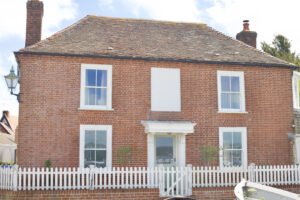Frequently asked questions
Please contact us if you cannot find an answer to your question.
No, if you have a fixed-rate mortgage, your interest rate will not go down if the Bank of England rate goes down.
Here’s why:- Fixed-rate mortgages: These mortgages have a set interest rate for a specific term, usually 2, 5, or 10 years. During this period, your interest rate remains the same regardless of changes in the Bank of England base rate or other market fluctuations.
- Bank of England base rate: This is the interest rate at which commercial banks borrow money from the central bank. It influences variable-rate mortgages, but not fixed-rate mortgages.
- Even though your fixed rate won’t change during the fixed term, it’s still worth keeping an eye on the Bank of England base rate. This can give you an indication of where interest rates might be heading when your fixed term ends, helping you plan for potential changes in your monthly payments.
The answer is YES!
It’s available to doctors and surgeons who are licensed and registered to practice in the UK.
As a surgeon, you’ll know better than anyone that ill health or an accident can happen to anyone at any time and when it does, the financial consequences can be devastating.
Talk to Fuse if you want to find out more and how to protect your income
Yes, it is possible for seasonal workers to get a mortgage, but it can be more challenging due to fluctuating income. Lenders typically assess your financial stability by looking at your income history over the past two to three years. Factors that can strengthen your application include:
- Consistent income history: Providing payslips, tax returns, or bank statements that show stable earnings over time.
- Good credit score: Demonstrating responsible credit management.
- Low debt-to-income ratio: Keeping your debts manageable compared to your earnings.

Yes, it’s possible to get a mortgage at 60, but there are some things to consider:
- Lender criteria: Lenders have different age limits and criteria. Some may be more willing to lend to older borrowers than others.
- Affordability: Lenders will assess your affordability based on your income, savings, and other financial commitments. They may also consider your retirement income if you’re retired or close to retirement.
- Mortgage term: The length of the mortgage term may be shorter for older borrowers, which could mean higher monthly payments.
- Interest rates: Interest rates may be higher for older borrowers, as lenders may perceive them as higher risk.
Here are some things you can do to improve your chances of getting a mortgage at 60:
- Have a good credit score: A good credit score will improve your chances of getting approved for a mortgage.
- Have a stable income: A stable income, whether from employment or retirement, will help you demonstrate your affordability to lenders.
- Have a large deposit: A large deposit will reduce the amount you need to borrow and may improve your chances of getting approved.
Absolutely not. If you earn an income you should think about taking out some cover. What if your income stopped due to accident or illness, how would you pay your bills? This is a worry that can be avoided, we can help you with this.
Apprentices can get mortgages, but there are some challenges to consider when applying.
An apprenticeship is a real job, just like any other. And this means that there are no separate rules for apprentices looking to get a mortgage. Lenders will assess your income, credit score, and deposit size when considering your application.
Apprenticeships usually are offered on fixed term contracts, which is now more widely accepted by lenders.
Speak to Fuse Financial if you have any concerns about your income or employment status as an apprentice if you want to apply for a mortgage.
http://www.employinganapprentice.com
Yes, in most cases you will have to pay stamp duty on a second property in England and Northern Ireland.
As of 2025, you’ll usually have to pay an extra 5% on top of the normal stamp duty rates if you’re buying a second home or a buy-to-let property. This means that the stamp duty rates for second properties are higher than those for first-time buyers or people moving home.
However, there are some circumstances where you might not have to pay the extra stamp duty. For example, if you’re buying a property for less than £40,000, or if you’re replacing your main residence. It’s always best to check with a solicitor or financial advisor to find out exactly how much stamp duty you’ll have to pay.
When your fixed-rate period ends
- Once your fixed-rate term expires, your mortgage will typically revert to a variable rate, usually the lender’s Standard Variable Rate (SVR). At this point, changes in the Bank of England base rate can affect your mortgage interest rate and monthly payments.
Keep in mind
- Even though your fixed rate won’t change during the fixed term, it’s still worth keeping an eye on the Bank of England base rate. This can give you an indication of where interest rates might be heading when your fixed term ends, helping you plan for potential changes in your monthly payments.
We will talk you through the process step by step. Firstly we need to work out how much you can afford to borrow and would advise you get an agreement in principle with a lender first to avoid any disappointment. We can help you with this.
A Joint Borrower Sole Proprietor (JBSP)
This is a type of mortgage where multiple people share responsibility for repayments, but only one person is the legal owner of the property. It allows you to boost your borrowing power by adding up to three additional people’s incomes to your mortgage application.
Here are some key features to consider:
- Shared responsibility: All borrowers are jointly liable for the mortgage payments.
- Higher borrowing capacity: Lenders consider the combined income of all applicants, which can increase the amount you can borrow.
- Legal ownership: Only the sole proprietor has legal claim over the property and any increase in its value.
- Flexibility: JBSP mortgages can be used by first-time buyers, those re-mortgaging, or purchasing a new property.
This type of mortgage is particularly helpful for buyers who need financial support or for families looking to help get their family members on the property market without taking ownership.

Once we have established your needs and requirements we will source the market to find you the most suitable and cost effective rates. We will explain the different rates and how they work and always make best recommendations to suit your individual circumstances.
Absolutely! Lenders criteria varies so its good to talk with a mortgage broker, once we understand your situation we can recommend the most suitable lender for you, save you having to work your way around the lenders, let us do the hard work.
A limited company buy-to-let mortgage is a mortgage that’s aimed at limited companies rather than independent landlords. It’s one way of getting a mortgage through your limited company, and not in your own name. You need a Special Purpose Vehicle (SPV) to manage your residential rental portfolio to get a buy-to-let mortgage. Buy to let mortgages for limited companies were created for the purpose of property investment and a more cost-effective way to invest in property.

